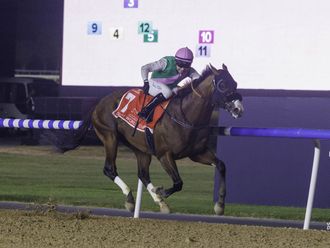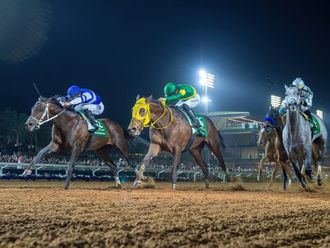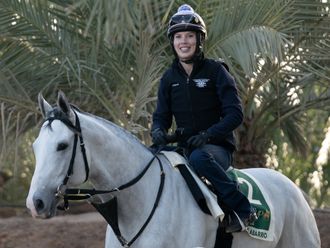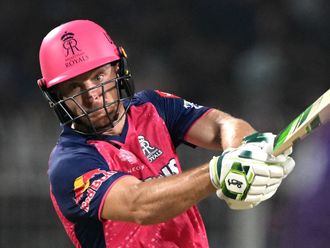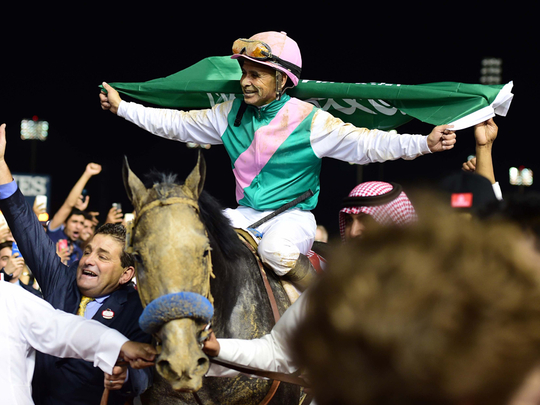
It's easy to get swayed by the bright lights and the big victories, by the wide hats and wonderful moments that the Dubai World Cup offers. After all, there's a good reason it's called the highlight of the UAE's social calendar.
But to keep things humming along smoothly, and ensure there are no mix-ups on this important day, dozens of people work behind the scenes to ensure things run as they should. Upset horses are calmed, jockeys reminded of their duties, and even, far away from the crowd, horses change hands. As we celebrate the 23rd running of the annual event, we profile a selection of these professionals.
Robert Stevenson | Farrier
As a farrier, 40-year-old Robert Stevenson’s job is to look after horses’ hooves. “Preparations involve making sure any lameness issues are handled in a timely manner because little things can turn into big things if they’re not handled immediately,” says Stevenson.
Hailing from Bundaberg in far north Queensland, Stevenson began working for Godolphin in Australia, at its stud farms in the Hunter Valley. That work brought him here to Godolphin’s stud farms in Hatta, then he crossed over and began working on racehorses.
On World Cup day, he performs the role of a badged official. “We’re also there from a regulatory point of view, just checking that horses are shod in accordance to the rules and we’re there just in case anything goes wrong,” he says. When a shoe needs fixing, racing attire poses a unique challenge. “Because we all wear suits on race day, you’ve got to very quickly get out of your suit jacket and don’t nail your tie to the shoe!”
But of course it has its advantages. “A lot of the horses that you hear about, read in the news, jockeys, trainers, all essen-tially come here and converge on the one day, so if you’re a racing nut it’s a great place to be,” he says.
Stevenson has been here 12 years and says Dubai is at the forefront of new technology. “The movement away from the traditional nailing on of shoes, steel shoes, is certainly coming,” he says. “We’re moving to polymers and custom-fit, custom-design, race traction, more like the human athlete.”
Ghrainne Clancy | Paddock Steward
“The job I do now is paddock steward,” says Clancy, who started her career in racing at the age of 15, studying at the Princes School in Ireland. “I ride out for a trainer in the morning and then I work at the races as well. I’ve been doing that since Meydan opened.”
She followed opportunities to the United States and Australia before arriving in Dubai 12 years ago.
On Cup day, the stewards arrive early and make sure all the equipment matches what has been authorised for each horse and if there are any changes to a horse’s requirements on the day, trainers will ask the stewards’ permission.
They ensure horses are in the correct order, jockeys are weighed and saddles are ready
before heading off to the Parade Ring for a few laps. “It’s so different on World Cup day,” says Clancy. “There’s a great buzz because you have the best horses in the world competing and the best people in the industry there.
“Then you have extra pressure because there are so many people around. It’s hard to get around and even see in the Parade Ring be-cause so many people [attend], photographers and everything, so that’s probably the hardest part of it,” she adds.
Once the bell rings, they make sure jockeys mount their horses and get off down to the gates safely and with enough time for the starter to check them over and load them, ready to start.
Ajay Anne | Bloodstock Advisor and Steward
Ajay Anne’s father was a member of the Indian cavalry, so he was born into riding as soon as he could walk.
The 39-year-old started his career at the Hyderabad Race Club in India. After studying a business degree, with postgraduate studies in horse racing he was accepted into what’s become the Godolphin Flying Start scholarship programme. He worked at tracks all around the world for Godolphin before setting up his own company advising clients on how to invest in racing bloodstock.
All the money is in stallion fees, he says, up to €400,000 (Dh1.8 million) per cover and there might be 150 mares a stallion meets in its career.
“Thoroughbreds are the most commercial horses,” he explains. “The breed’s been monitored and regulated for hundreds of years. It’s worth billions all around the world.”
As well as working at the racecourse as a steward on Cup day itself, Anne’s World Cup preparations for his clients start much earlier.
“As a bloodstock advisor, that work starts six months in advance,” he says. “I start looking for potential horses who could participate in the Dubai World Cup. I coordinate with the trainer to see how we do the preparatory runs, what jockeys we use, what distance we run and what kind of course we run so we are spot on for the big day.”
Dick Fear | Head Outrider
Dick Fear started in racing in 1982 as a “tiny, skinny” 15-year-old after his father dashed his hopes of joining the Army then promptly found him an apprentice jockey position at Gloucester instead.
After working his way up he led a successful, if brief, career as a jockey, riding 26 winners before a serious accident forced him to retire.
Fear used the opportunity to move into more managerial roles and after some time in Saudi Arabia, he started working as an outrider in Dubai, where he’s now been for 23 years.
Outriders, 52-year-old Fear says, are essentially safety officers on horseback. “We’re officials and we stand on the track in the morning, make sure everybody does the right thing, goes the right way, wears the right thing.
“If there’s one that’s loose we help to catch it, retrieve it and bring it back, make sure all the riders are safe.”
Accidents are not common, but when they do occur it’s the head outrider’s job to control the panic before everything escalates.
“If there are 40 or 50 horses it’s hard to get everyone off at the same time, making sure that everyone is safe. We have to try and clear the track as fast as possible.”
This will be his 12th World Cup as head outrider. His extra responsibilities on the day include escorting the TV crew who interview the winners and rigging up their outrider ponies with cameras and microphones.
Fear says it’s a lot of hard work and the early mornings are tough but it would be much harder in the UK. “We’re fortunate to be here in Dubai. There’s nothing like waking up in the sunshine!”
Shane Ryan | Senior Starter
Ryan, 44, grew up with horses at home in Ireland, hunting and showjumping from an early age. He’s been in the industry for 28 years, starting out as a work rider in Ireland and the UK, then as a jockey riding hundreds of mounts in England and Japan, before arriving in Dubai in 2000.
As the official starter for Dubai Racing Club and Emirates Racing Authority, he may be the most important person on the track in those heart-pounding moments before the gates fly open, but his hard work begins three months earlier, schooling horses on how to start a race and test them loading into stalls. “My job is to go around the UAE, to Meydan, Sharjah, Al Ain, Jebel Ali and Abu Dhabi and go to the farms and trainers outside that want help with difficult horses to load,” says Ryan. “If they’re difficult to load or unruly, we help them.”
Once they’ve passed their stalls test, horses need to attend trials at Meydan to bring them up to a certain standard so they can come racing.
“I like schooling difficult horses,” he says. “It’s nice to see them go to the races and do well because you’ve achieved what you enjoy doing.”
For those horses who’ve flown in for the carnival, Ryan will be in close contact with starters at their home tracks all around the world to make sure he has the inside information on how the horse might behave on the night and confront the situation if necessary.
“If I hear they’re difficult, or I’m unsure of their behaviour, then I’ll ring the trainer and we’ll have to discuss it.”


